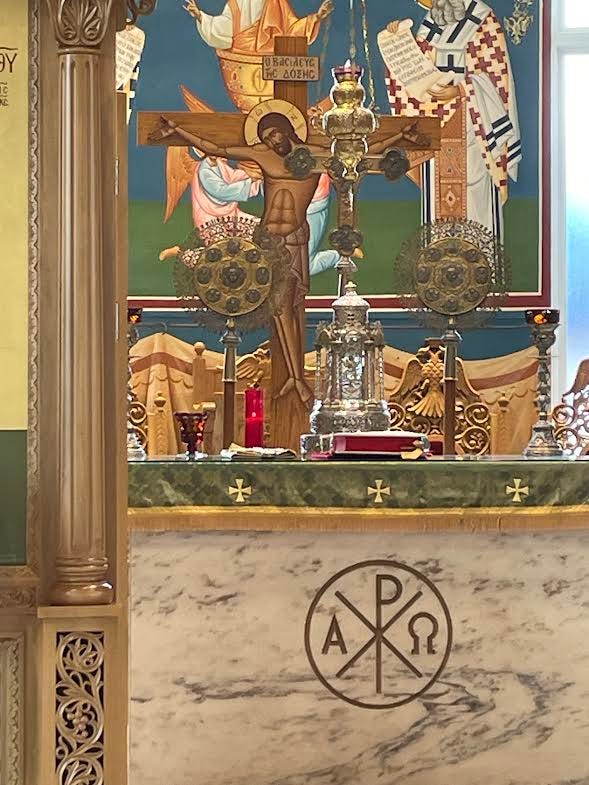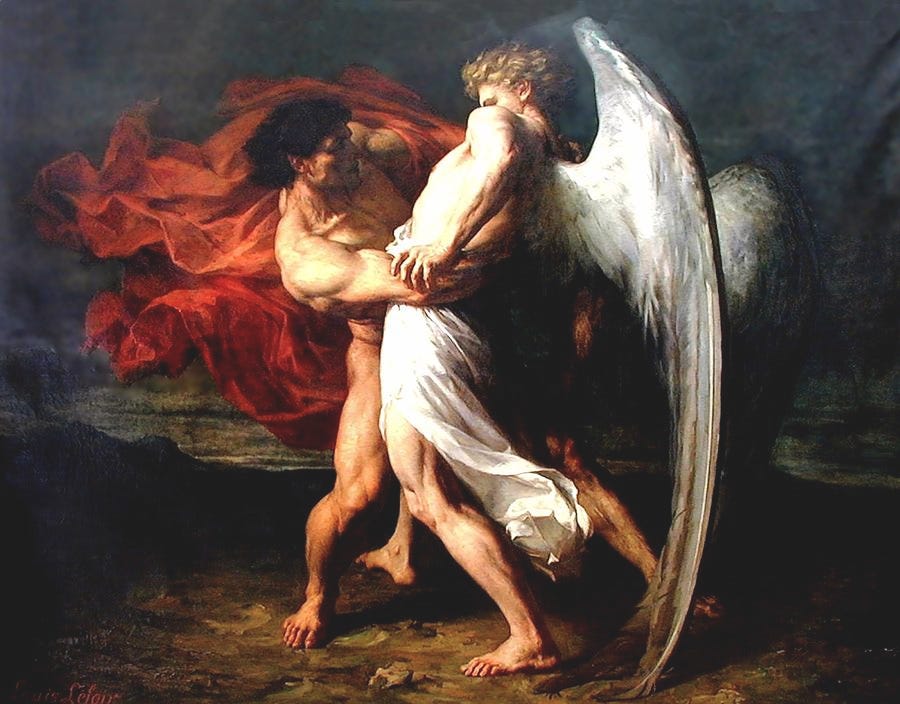In the past year, I have learned what it means to wrestle with God. This concept is a timeless one, something that has been explored—even quite literally—throughout biblical texts and through the writings through the ages as a direct reflection of a key element in man’s never-ending quest to understand our Creator.
It is a state in which anguish, rage, sorrow, and loneliness coarse through every fiber of our being as we struggle desperately, with existential fervor, to see as He sees. Doubt and irritation are woven with tenacity as we challenge the Almighty with boldness in one breath, then collapse into tears, begging, the next. Yet, as the persistent veterans of the war against Flesh and Soul know, His mercy outlives our strife. Despair eventually gives way to peace and the firm conviction that He alone is sovereign in this world.
In a yearlong match that has been equal parts pain and euphoria, my life has shifted drastically for the Lord’s sake. My love for Him has increased tenfold and my doubts diminished, wholly erased, or turned over to dearest Yahweh to be sorted out at a later date. He has shown me how to surrender to His loving embrace, and in return for my devotion, has given me peace.
Around this point last year, my mind began to increasingly orient itself towards the nature of God. The divine had been a longstanding interest of mine, whose flames were suddenly stoked until its fires consumed me. In a short time, I became obsessively fixated on understanding the spiritual dimension of the cosmos and the various spiritual traditions of man, even entertaining the likes of soft pagan occultism. Yet the Almighty was the sole focal point where all my thoughts would begin and end.
This fixation was so overwhelming, in fact, that it wasn’t uncommon for me to spend days in near-silence because I was unable to talk about anything else with much interest.1 However, my first instinct wasn’t to immediately surrender to the Creator and boldly proclaim allegiance. (I’m naturally stubborn.) Rather, it was to grapple with the very notion that He wanted me and I needed Him.
Like the scores of those who have come before me, as a child, I developed the idea that Elohim was a cruel deity who only loved a chosen few. The rest of us, apparently tainted with sin from birth, were destined for Hell—cast off into the clutches of Satan because we just weren’t good enough!2 Then, as a teenage Deist, I believed that God was some impersonal master, who stepped away from His creation and didn’t care what happened to us next. Through His direct intervention, however, I came to the conclusion that God does see us and does care, even if we do not reciprocate that same love in return.
Still, I claimed I want didn’t to embrace Him. Not fully. Not totally. Not yet. I feared losing myself. Due to the distorted teachings of society, words such as “submission,” “repentance,” “surrender,” “kneel,” and even “worship” had become too closely associated in my mind with fiery preachers, vitriolic adults, money-hungry profiteers, and a deep sense of guilt, shame, and self-loathing for me to even grasp the possibility of embracing my Creator with genuine love and reverence. I had come to believe that surrendering to God was akin to surrendering in warfare—that I would be losing everything and gaining nothing in return but the vague hope for a spot in Heaven.
Despite this, however, part of me still longed to be with Him. This yearning came from the depths of my soul, inexplicable to my so-called “rational” mind! But perhaps the most primal desire of the homo sapiens is to be reunited with God.
My love was a fragile sprout—delicate, uneasy, and anxious. For months, I hesitated to embrace the Lord, and yet, He was patient enough to continue sparring with me.
Part of this resistance included an active avoidance of Christianity. Of course, my heart kept returning to the Church, even after I explored of other faiths and philosophies. I would spend hours staring at photos of icons and angels, dreaming of basilicas and the delicate caress of the Holy Spirit. At one point, I developed a sort of mini-obsession in which I drew arrays of crosses on my body daily alongside messages like I AM GOD’S. (Return labels, in case I got lost.) In many ways, the whole affair felt taboo, but I didn’t want to stop. Looking back, it’s obvious what I really wanted but my own pride prevented me from seeing it.
I struggled with my Christian fascination for months, my nervous interest in the Church and Trinity growing until one Sunday in Spring, the Lord brought me to the steps of the Orthodox Church. If I had been wrestling with Him before, this is truly where our match began.
I initially discovered Eastern Orthodoxy in a thousand, separate little ways—the name of a saint uttered here, a chant in my playlist there. My first genuine introduction, however, was through the technical theology of the pre-Schism Church, as described in the book Justinian: Emperor, Soldier, Saint by Peter Sarris. Woven among accounts of epic battles and political drama were sections carefully detailing each Ecumenical Council pre- and post-Justinian, why they were held, and their resulting doctrines and heresies. Through this, I was able to deeply analyze my own spiritual views, almost line for line. To my surprise, my understanding of God mirrored that of pre-Schism Christianity to a shocking degree.
This was in the winter of 2023. I was intrigued by the little I knew about Orthodoxy and did more research. I was hesitant to really sink my teeth into it, though, given my distaste towards contemporary mainline Christianity. It wasn’t until I had become so plagued by thoughts of being separated from Our Lord—and was growing physically unwell from the stress—that I finally caved in.
On the fifth Sunday of Lent, I attended my first liturgy. I hadn’t been in a church in years. But it was there, in that tiny, crowded narthex, that I knew I was home.

The church was small, warm, and terribly crowded. I was overdressed, just like the college boys there, in an awkward parroting of our elders. Incense clouded the air, slurring my senses. And though my ears couldn’t comprehend a single word that was chanted, my heart understood clearly. I stood shoulder-to-shoulder with strangers of all ages and races, surrounded by their elated voices.
As I watched the strange, wondrous procession within the nave, something in me stirred. I cried. My heart felt like it was bursting at the seams with joy. All I could do was smile and give thanks unto the Lord.
Yet, my old wounds remained unhealed. In the months following, I challenged the Lord, His vision for the world, and where I stood in it. Further, I sought understanding—even if only implicit—on how to approach biblical texts and the teachings of the Church. I challenged Him on the grounds of my same-sex attraction—whether He could ever accept a child of such a nature, whether I could accept myself, and if was even possible for me to reconcile His demands with my wants. Again, I feared losing myself, or rather, who the world told me I was.
But by Halloween, I realized that every answer I sought had to be sought through Him. By then, I had spent six short months submerged in Orthodoxy, studying God, praying to and conversing with Him. Through this, I learned that the only way to truly know God is to submit to Him, completely and totally.
This year, life has been completely rearranged and is still being shifted around at this very moment. And for that, I am blessed. Sweet Adonai has shown me that surrendering to Him is not some horrible, debilitating fate. Rather, it is the path to freedom. God is not an oppressor, but a liberator.
To submit to God is to humble yourself before Him, to listen carefully for His guidance, and to make Him your center in all things. In our surrender, the Lord does not ask us to destroy ourselves but to discard the false selves that the world teaches us to cling to, and instead embrace our true natures as guided by the Holy Spirit.
When we trust in God and begin to abide in Him—and, in turn, He in us—we learn how to live the lives our grand designer always envisioned for us. As we gain purity in body, mind, and soul, we keep our unique gifts and traits. We never lose anything but that which neither serves Him nor us. In time, we learn to embrace our roles as His royal priests and sacred temples on Earth. Ultimately, wrestling with God—though painful and frustrating—is necessary. Through it, we learn to better discern our undisciplined, worldly thoughts from His divine Will, so that we may cast away our frivolity and become more like Him.
Now, as we go forth to celebrate the birth of our Lord and enter into the New Year, I am eager to see what my journey with God will bring. I put my full trust in Him—my King, my Savior, my Creator, and my Love. I know I will wrestle with Him again and again, until death. I know I will wrestle within myself and even with others who mock me for my ever-becoming beliefs. But to struggle in search of grace and divinity in the eyes of the Living God is nothing short of beautiful.
I pray for those who feel distant from Him, who search for Our Lord but feel forsaken and unworthy. I tell you, keep wrestling with Him. Wrestle with Him through this world. Seek Him. Challenge Him. Challenge yourself and all you know. With persistence, determination, humility, patience, and an open heart, you will find the blessings that you seek.
May the angels smile upon you.
As of writing, this is still a fairly common occurrence. I just smile more to compensate.
Though this outlook is perhaps a tired cliche, I believe it speaks volumes to the poor theological education we provide our youth. We teach them to negatively fear God, ignore Him, and/or weaponize Him. In doing this, we sin against our children and rob them of their divine birthright.







Thanks so much for sharing this! I didn't know your story, and I always love hearing about people's journeys to Christ. So glad you found a place where you feel at home!